May 6, 2025 | 07:09 GMT +7
May 6, 2025 | 07:09 GMT +7
Hotline: 0913.378.918
May 6, 2025 | 07:09 GMT +7
Hotline: 0913.378.918

Ms. Dao Thu Trang: 'Vietnam is considered a hot spot for drug resistance'. Photo: Tung Dinh.
Ms. Dao Thu Trang, Project Lead for the Vietnam Fleming Fund Country Grant at FHI 360, shared that drug-resistant infections currently claim about 700,000 lives annually. Without effective interventions, this trend could accelerate at a geometric rate. By 2050, if current trends continue, around 10 million people could die each year from drug-resistant infections, with 89% of these deaths occurring in low- and middle-income countries. Health economists estimate that by 2050, up to USD 100 trillion in global production could be lost due to antimicrobial resistance (AMR).
AMR has garnered global attention, with numerous nations and international organizations involved. In 2014, former U.S. President Barack Obama introduced the Global Health Security Agenda, which included 11 action packages addressing AMR. The World Health Assembly adopted the Global Action Plan on Antimicrobial Resistance, developed by the WHO in collaboration with the FAO and OIE, promoting a One Health approach. In 2015, the United Nations Declaration on AMR underscored the importance of the One Health approach.
By 2022, the FAO, OIE, WHO, and UNEP jointly issued the Strategic Framework for Action on AMR under the One Health approach. In September 2024, leaders at the United Nations General Assembly (UNGA) adopted the 2024 Political Declaration to address the global threats of AMR. According to the 2016 AMR Review, chaired by Jim O’Neill, 10 key steps were outlined to address AMR, including drug development, reducing antibiotics in animals, surveillance, and improved diagnostics.

Antibiotic resistance is becoming a global problem. Photo: Dieu Linh.
The Interagency Coordination Group on AMR brought together partners from the UN, international organizations, and experts from various sectors to formulate a blueprint for combating antimicrobial resistance. At the World Health Assembly in May 2015, a global action plan was endorsed to tackle antimicrobial resistance and ensure the successful continuity of treatments.
The UK-sponsored Fleming Fund has allocated £200 million to support low- and middle-income countries in generating, sharing, and using AMR data to reduce drug resistance across 25 priority countries in Africa and Asia. The Fleming Fund’s four principles are based on One Health, alignment, sustainability, and country ownership. “We work closely with governments to ensure all activities address the priorities in the National Action Plan and strengthen national health systems,” stated Ms. Trang.
Initially, the Fleming Fund proposed five targets, focusing on establishing partnerships between sectors, government, and organizations. Additionally, the fund aims to equip nations with the capacity to collect and use AMR data. “A small transformation in antimicrobial viruses can lead to a global epidemic,” said Ms. Trang, who called for enhanced awareness and committed resources to fully address the situation.
In Vietnam, Ms. Dao Thu Trang described AMR as a silent pandemic, with Vietnam considered a hotspot for drug-resistant infections. Vietnam ranks 14th among 27 countries with a high burden of multidrug-resistant tuberculosis. Notably, 88% of antibiotics in urban drugstores and 91% in rural drugstores are sold without prescriptions. About 13.4% of total sales in urban drugstores and 18.7% in rural drugstores involve antibiotics. Even one-quarter of children receive antibiotics before proper diagnosis at a hospital.
In response, the government and various departments have implemented several AMR prevention and control programs. In 2010, the International Ministerial Conference on Animal and Pandemic Influenza (IMCAPI) held in Hanoi adopted the Hanoi Declaration. In 2013, Vietnam joined the Global Health Security Agenda and developed the AMR Action Plan 2013-2020 and the Agriculture Sector Plan 2018-2020. Two years later, Vietnam signed an Aide Memoire on Multisectoral Commitment to Antimicrobial Resistance Prevention and Control, involving four ministries and three development partners.
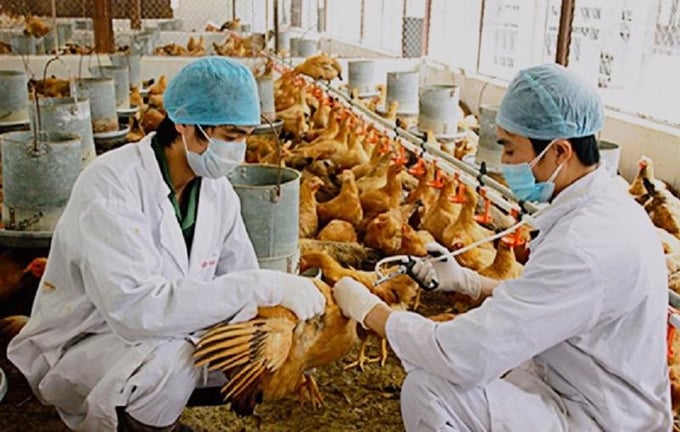
Vietnam announced a ban on the use of antibiotics to prevent disease in livestock farming from 2026. Photo: Tung Dinh.
In 2023, Vietnam introduced the National Strategy on Antimicrobial Resistance Prevention and Control (2023-2030), with a vision towards 2045, and signed a Multisectoral Cooperation Agreement on AMR prevention and control involving four ministries and six development partners.
With these efforts, Vietnam was selected by the Fleming Fund as a base for its 269 laboratories. The initiative focuses on four regions: Southeast Asia, East and South Africa, and West Africa. In Vietnam, the first phase of the Fleming Fund (May 2019 - March 2024) received over £8.8 million (around 300 billion VND) via FHI 360. Its main partners are the Department of Animal Health under the Ministry of Agriculture and Rural Development and the Medical Services Administration under the Ministry of Health.
The program targets strengthening One Health approaches to data sharing, AMR, and AMU surveillance systems in both human and animal health sectors. Specific goals include enhancing laboratory infrastructure, procuring equipment, renovating laboratories, providing maintenance services, building human resource capacity, strengthening surveillance systems, establishing platforms for data use, and promoting rational antibiotic use.
Thanks to resources from the Fleming Fund, Vietnam has established the National Antimicrobial Resistance Strategy (2023-2030), the Monitoring & Evaluation Framework, the AMR Action Plan for Agriculture (2021-2025), and the National Steering Committee, along with subcommittees and technical working groups on AMR.
Nineteen health laboratories have been upgraded, with improved LIS-HIS systems, 18 advanced automation systems, and hundreds of IT/laboratory devices provided. Vietnam is now capable of reporting to WHO’s global AMR data portal for the first time.
Building on these achievements, the Fleming Fund will continue its efforts in Vietnam in a second phase, targeting enhanced surveillance systems for AMR, AMU, and AMC across human, animal, and environmental sectors, while integrating AMR content on fisheries into its action plan.
The Fleming Fund is a UK aid program exceeding £200 million, supporting low- and middle-income countries in generating, sharing, and using AMR data to reduce drug resistance across 25 priority countries in Africa and Asia. In September 2024, at the UNGA, the UK government announced an additional £85 million for global AMR prevention and control.
Translated by Linh Linh
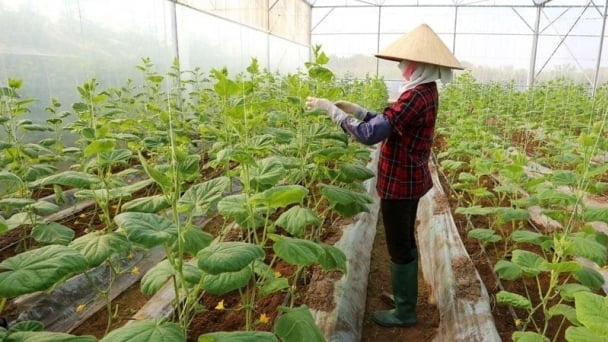
(VAN) Vietnam's new land policy expands farmers' rights while also encouraging capable individuals to develop sustainable agricultural production.
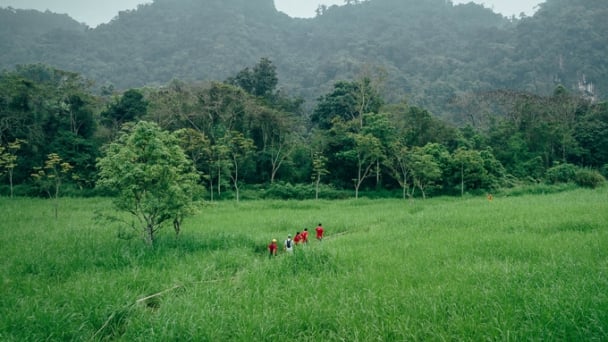
(VAN) WWF and IUCN hope that the Vietnam Agriculture and Nature Newspaper will continue to guide positive behavioral change toward a more environmentally responsible and friendly society.

(VAN) Vietnam’s Party Chief To Lam and Sri Lankan President Anura Kumara Dissanayaka agreed to deepen cooperation in agriculture, education, culture, and people-to-people exchange.
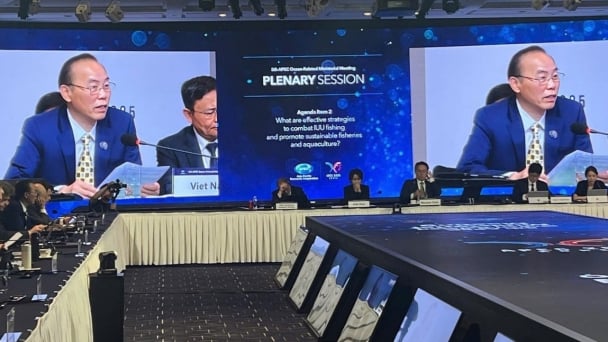
(VAN) Deputy Minister of Agriculture and Environment Phung Duc Tien participated in the AOMM5 in Busan and lead a delegation to meetings with the South Korean Ministry of Oceans and Fisheries.

(VAN) FAO calls to enhance monitoring and initiate early control measures in affected countries

(VAN) Prime Minister Pham Minh Chinh held discussions with Japanese Prime Minister Ishiba Shigeru, where two leaders agreed to sign a Medium and Long-term Vision for Agricultural Cooperation 2025-2030.
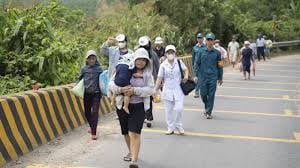
(VAN) The training event held in Hoa Phu (Da Nang) highlighted the importance of incorporating gender factors in order to protect communities from disasters.